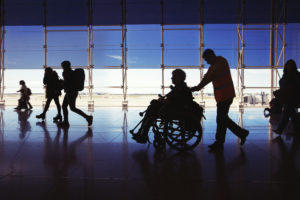Overview of the Situation
A 55-year-old seafarer, who fell while working on board a ship, was admitted to a hospital in Salvador, Brazil, with a fractured neck of femur.
Initial Client Requests
After reviewing both the severity of the fracture and the elapsed time between injury and diagnosis, MedResQ advised that surgery in Brazil was the only medically appropriate option. The surgery was completed two days later, with a Dynamic Hip Screw used to fix the fracture. Following surgery, both the patient and employer/underwriter were keen to travel home as soon as possible.
Escalation and Challenges
Normal considerations for repatriation typically include the number of flight sectors, the time elapsed since surgery, the patient’s pain level, the ability to manage their own care needs, the ability to self-inject anticoagulant medication, mobility, age, general physical condition, and haemoglobin level. However, the COVID-19 pandemic complicated escorted commercial repatriations due to increased risk of canceled flights and unforeseen transiting and immigration problems.
Action Plan Implementation
MedResQ advised its client that the patient could be rehabilitated for unescorted travel if safety parameters around stability were met. MedResQ collaborated with the local hospital and used video links to evaluate the patient’s progress and ensure physical suitability for unescorted travel. The patient’s medical data was reviewed, and remote support provided, including:
- Monitoring his haemoglobin level as it rose over several days from 90g/L to above 100g/L
- Evaluating his vital signs and pain levels
- Assessing his gait and stability when walking with a stick instead of a frame
- Supporting his practice for self-injection administration
MedResQ selected the best flight options with good connection times in Brazil and Amsterdam, confirmed medical clearance, and provision of wheelchair assistance.
MedResQ’s Response in Action
MedResQ provided the patient with a detailed explanation of the routing, airport assistance provision, and emergency contact numbers. With the support of agents in Salvador and Rio de Janeiro, the patient was assisted with check-in and meeting the connecting flight. MedResQ kept in regular contact with the patient throughout his journey via WhatsApp and kept the client apprised of his progress.
Successful Resolution
Thirteen days after surgery, the patient safely arrived in Kiev. Through meticulous planning and good communication, MedResQ was able to mitigate and manage travel risks, optimizing the patient for a safe, unescorted repatriation.





